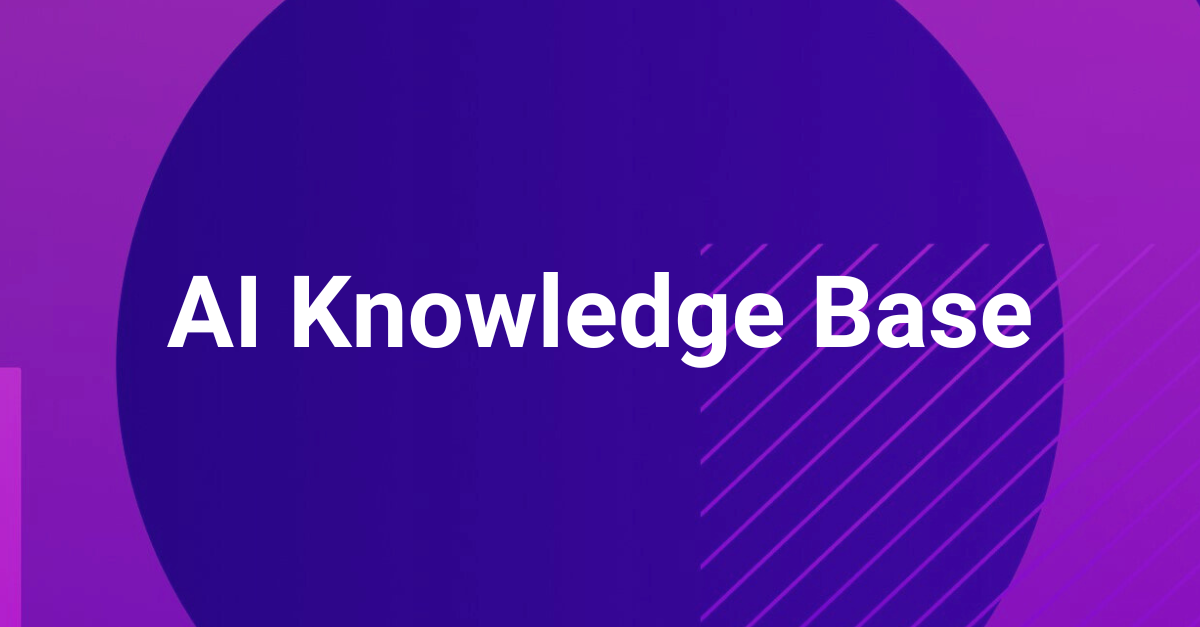Businesses worldwide are drowning in data. In 2022, 97 zettabytes of data were created, captured, copied, and consumed globally. By the end of 2025 that number is expected to nearly double to 181 zettabytes.
Particularly for rapidly scaling enterprises, it's challenging to create a centralized place to store this data, easily access it, and ensure its accuracy and that it’s up-to-date.
Instead, most businesses suffer from siloed knowledge repositories. According to Gartner, 47% of digital workers struggle to find the information they need to do their jobs. Time spent searching for information is time that could be spent doing more valuable, strategic work.
Enter AI-powered knowledge management solutions, which can help organizations manage their growing information repositories.
With AI, the creation, storage, retrieval, sharing, and application of knowledge become more efficient, accurate, and accessible. This transforms the way organizations manage information and how quickly they can make decisions—no matter how much information they have in their archives.
So, what is an AI knowledge base?
An artificial intelligence (AI) knowledge base is a centralized digital repository that stores, manages, and distributes information, such as FAQs, how-to guides, troubleshooting instructions, and other resources. This intelligent repository of information supports customers and employees by helping them find answers and solutions quickly.
Modern AI-powered knowledge bases also feature enhanced search functionality that surfaces the most relevant content based on user intent. This helps teams find what they need to solve problems quickly and without friction. Compared to traditional knowledge bases, modern AI knowledge bases can also automate content generation and updates for more streamlined knowledge management.
These systems are managed by IT departments or specific knowledge-management departments, who work alongside customer service and tech support teams to ensure that all content is accurate, relevant, and always up to date.
Knowledge base content types
Knowledge bases include several different content types: unstructured and structured content, as well as automated content.
- Unstructured content is the least refined. It lacks organization and clear formatting, resulting in long paragraphs, nested lists, or haphazard tables in emails, PDFs, and long articles. AI systems find it difficult to parse this kind of content for relevant insights, stifling workflows and slowing down productivity.
- Structured content, on the other hand, follows consistent formatting best practices, such as using clear headers, bullet points, and numbered steps. Importantly, structured content prioritizes readability, enabling swift analysis, clear answers, and a smooth employee and customer experience.
- Automated content is generated, updated, and maintained by AI knowledge bases. Using machine learning (ML) and natural language processing (NLP), AI tools analyze data from support tickets, agent notes, and other sources and then dynamically generate and update content independently, as needed.
Automated content can be a big win for your business efficiency because it reduces the manual effort needed for content creation, updates, and management. Plus, automatic updates help ensure content is always accurate, current, and ready to support your employees.
How does an AI-powered knowledge base work?
AI knowledge bases use Natural Language Processing (NLP) and Machine Learning (ML) capabilities to understand and respond to user queries in real time. First, these systems leverage NLP to comprehend users’ natural, conversational language. By identifying keywords and interpreting intent, the AI can match users with the most relevant knowledge base articles. It then instantly retrieves information from the centralized repository, providing accurate and relevant responses.
Moreover, ML capabilities enable AI-powered knowledge bases to continuously improve over time. With each interaction, the system learns from user behavior and feedback. It analyzes customer interactions to identify patterns, refining its ability to respond to future queries more quickly and accurately. This ongoing learning process allows the knowledge base to adapt and evolve, ensuring that it consistently delivers high-quality, relevant information to users. Additionally, by analyzing vast amounts of data, these AI systems can uncover insights that help optimize the knowledge base, streamline processes, and enhance user experience.
Why businesses need an AI-powered knowledge base
If you want to increase productivity, boost efficiency, and deliver better experiences to both your customers and employees, it’s time for your business to upgrade to an AI knowledge base.
After all, it’s been reported (IDC) that Fortune 500 companies lose $31.5 billion annually due to poor knowledge-sharing practices and inefficiencies.
Think about how intelligent knowledge bases could streamline and simplify knowledge management to support your teams. Instead of wasting time struggling to find overly complex, outdated information in cluttered repositories, your employees can get the precise answers they need instantly.
A knowledge base using advanced AI can intelligently understand user queries and immediately connect them to solutions by surfacing the most recent insights from the most relevant knowledge base content. It can even personalize responses based on information like user location and role.
AI-powered knowledge bases enable self-service by empowering users to access relevant information quickly. This has powerful implications for productivity, user experience, and cost.
Most obviously, AI improves productivity by enabling teams to get the answers they need quickly, allowing them to move on and focus on more complex or relevant issues. A study from Nielsen Norman Group found that support agents who use AI can manage 13.8% more inquiries per hour than those who don’t.
In addition, speedier responses create more enjoyable, user-friendly experiences and streamline costs. An AI-powered knowledge base saves time and resources by helping teams resolve issues more quickly, enabling operations to scale without increasing headcount. According to Harvard Business Review, AI-powered knowledge bases are one way to help employees embrace AI at work.
The advantages of incorporating AI-powered knowledge bases into your workflows are clear — and businesses that don’t are at risk of falling behind.
Learn how leading service desks answer IT questions in seconds by employing the 5 best practices for a better knowledge base.
Key considerations for choosing AI knowledge base software
Working with an AI-powered knowledge base can help your business improve operational productivity, enhance user experiences, and lower operational costs. But it's important to choose AI knowledge base software that matches your business’s specific knowledge management needs and goals.
When choosing AI knowledge base software, pay attention to:
- Scalability: Can the software scale to support increasing content and user queries as your business grows?
- Security: What security measures does the software have to safeguard your data? Can you adjust permission settings and user access to protect critical information?
- AI models: Can the software integrate with the AI models your business is currently using? Does it support ML and NLP capabilities?
- Customer support: What customer support is available? Will your team have guidance for implementation, maintenance, troubleshooting, and onboarding?
- Integrations: Consider the many different applications your business uses. Can the software integrate with all of your existing tools and platforms?
Choose AI solutions that let you enhance your employees’ ability to self-serve answers by generating knowledge articles tailored to your unique enterprise context and data.
- Scale Self-Service: Use AI to instantly create personalized documentation from support tickets.
- Find Knowledge Gaps: Save time with AI recommendations based on actual employee queries.
- Pinpoint Updates: Easily update content by identifying overlaps with existing articles.
5 top AI knowledge base examples
To help you find the best knowledge base for your enterprise’s needs and goals, we’ve evaluated the top AI-driven knowledge bases, and compared their features and functionalities.
1. Moveworks
Moveworks is on a mission to improve the employee experience through AI. The Moveworks Copilot assistant integrates with all of your business applications, tools, and systems to automatically deliver the right resources to employees on demand, while Moveworks Knowledge Studio enables you to centralize all forms, knowledge articles, and FAQs.
What’s special about Knowledge Studio is its AI automation capabilities. Moveworks' AI platform can instantly create documentation personalized to your business with your unique business context. It mines your support tickets and agent notes to surface relevant insights and then turns those insights into new knowledge base articles.
The Knowledge Studio can also identify gaps in your current knowledge base repository, and recommend new articles based on real employee demand. This enables your business to update, generate, and maintain content with hardly any manual intervention, saving your employees time and enabling them to focus on more strategic tasks.
To see the platform in action, take a look at Hearst, a media company comprising 360+ businesses, which implemented Moveworks Knowledge Studio to speed up employee support and stay competitive.
With 4,000+ knowledge articles and diverse disconnected systems, Hearst had a complex IT environment that frustrated employees more than helped them. But with help from Knowledge Studio, Hearst employees can now ask for what they need using conversational language.
The Moveworks platform then surfaces personalized, actionable resources in seconds, speeding up the support process and enabling employees to keep pace with the increasingly rapid news cycle.
As a result, 57% of Hearst support issues were resolved autonomously — see how.
2. Slite
Well-received in the knowledge industry, Slite is another AI knowledge base that helps teams document and share content.
The platform uses AI-powered search to facilitate quick and efficient knowledge retrieval from your knowledge base. It also has collaborative editing tools that allow multiple users to work on the same content simultaneously, helping teams create, organize, and manage knowledge base articles more seamlessly.
It’s a good choice for businesses that need simplified document management and easy collaboration capabilities.
3. Tettra
Tettra is an internal knowledge base powered by AI that helps teams easily manage and access content to swiftly get answers to their questions.
When a user asks a question, Tettra searches through knowledge base content to find the most relevant information. It can also generate reusable answers for common questions so you can store the information for easy access in the future.
Tettra is a practical choice for businesses with a cluttered knowledge base that needs help accessing relevant information more quickly.
4. Zendesk
Zendesk is a popular and well-reviewed AI-powered knowledge base designed to help improve customer satisfaction and increase efficiency.
It features AI-powered generative search to help employees get instant answers to their questions without having to manually search through a repository. It also uses ML to spot gaps in content and help your teams continuously grow the knowledge base. In addition, Zendesk has a customer self-service portal where customers can go to get answers to their own questions without having to contact an agent.
Zendesk is a viable choice for businesses looking for automation to solve issues faster.
5. Guru
Guru creates a single source of truth for your business to help teams access knowledge across different chats, apps, and documents.
With Guru, you can create customizable knowledge agents to get tailored insights for specific teams or projects. This AI assistant can help streamline knowledge management and scale knowledge-sharing across IT, HR, and sales.
Guru is a good fit for teams that need to access knowledge from diverse applications and tools all in one place.
How to set up your AI knowledge base
After you’ve chosen your AI knowledge base software, follow these three steps to configure it so that it can be easily understood by AI and to best support your enterprise’s needs, workflows, and goals.
Collect existing resources: Gather current documents, FAQs, troubleshooting guides, policy articles, and other resources that you want to integrate into your new AI knowledge base. Ensure all resources follow formatting best practices.
Create new resources: Be sure to create new content that “snippetizes” well. In other words, prioritize creating structured content that’s easy for AI systems to parse for relevant insights. Additionally, avoid using complicated technical jargon; instead, create content that uses natural, conversational language to improve searchability and readability.
Collect feedback: After implementation, take time to gather user feedback. This will help identify gaps for new content, find areas where you can clarify ambiguities, and pinpoint content that needs updating, refining, or “snippetizing” to optimize it for responses to user queries.
Implement a knowledge management system that updates automatically
If you want your enterprise to remain competitive tomorrow, you should adopt the right AI tools today. By implementing an AI-powered knowledge base system that automatically creates, updates, and maintains content, you ensure your employees have on-demand access to the information they need right when they need it. This leads to increased productivity, better user experiences, reduced operational costs, and improved scalability.
Moveworks Knowledge Studio is a best-in-class AI-powered knowledge base that can help your enterprise get the most value from your resources by bringing together your diverse forms, articles, and FAQs into one place. Moveworks integrates with all of your business applications, tools, systems, and departments, so that Moveworks Copilot assistant can deliver the right resources to your employees at the right time.
With the implementation of Moveworks Knowledge Studio, Broadcom has achieved remarkable efficiency, resolving 57% of its IT issues autonomously—a testament to the transformative power of AI-driven productivity solutions.
Supercharge your employees’ ability to self-serve answers to common questions by generating knowledge articles based in your unique enterprise context and data – learn more about Knowledge Studio.
Table of contents



